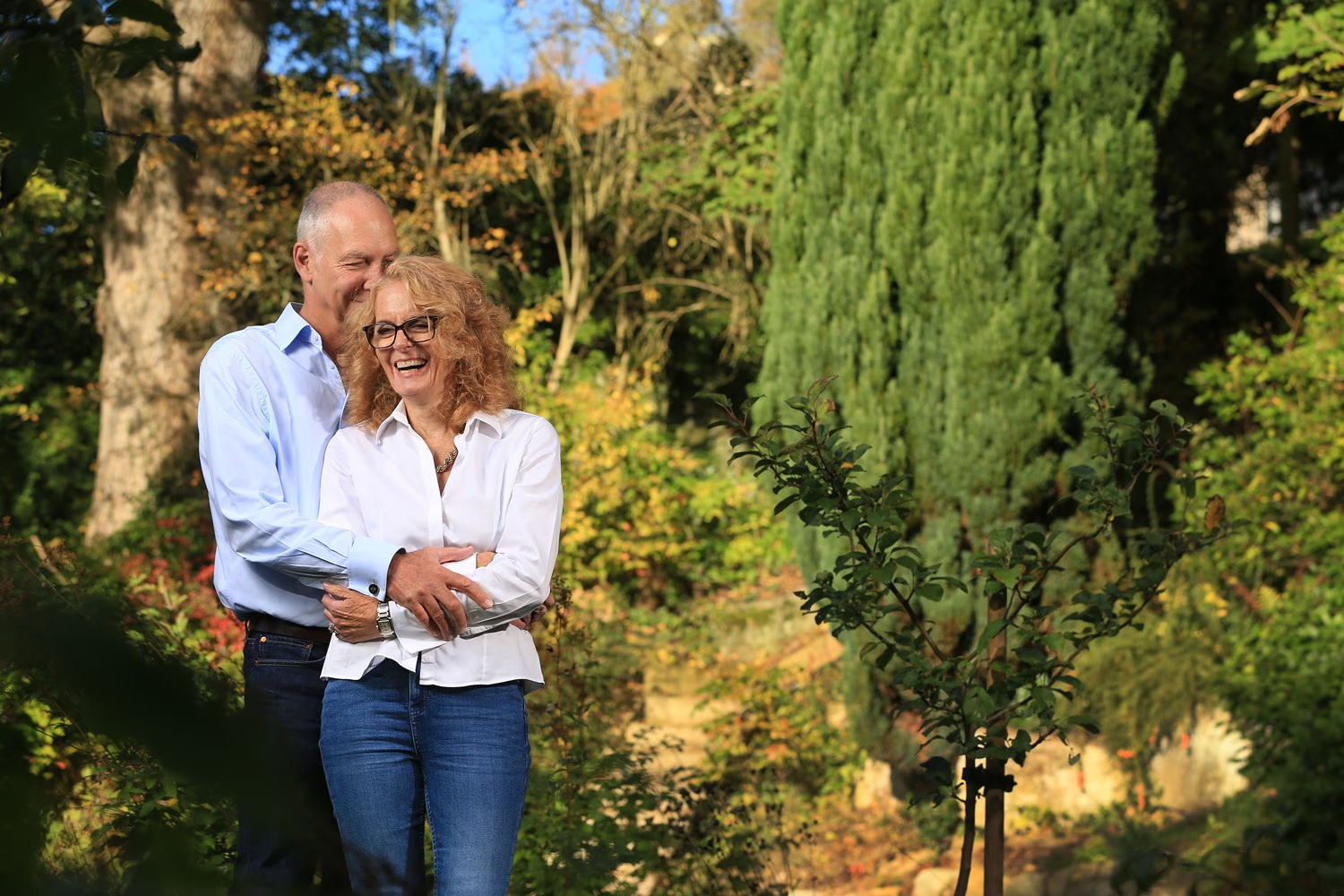
Living with Motor Neurone Disease - Louise's story
Peer reviewed by Dr Krishna Vakharia, MRCGPLast updated by Amberley DavisLast updated 19 Jun 2023
During a career helping patients living with Motor Neurone Disease (MND), Dr Louise Jordan was diagnosed herself. In her own written words, she shares with us her personal story of losing her speech, getting diagnosed, living with motor neurone disease, and receiving support, love, and care from partner Rob.
In this article:
"As a doctor who has cared for many people with MND, this disease was my greatest fear." - Dr Louise Jordan from Derbyshire.
Continue reading below
What is motor neurone disease?
Motor neurone disease, or MND, is a disease that progressively damages the nerves that make your muscles move. For the 5,000 adults in the UK with MND1, symptoms develop rapidly and eventually become fatal.
But for those living with MND life doesn't end after diagnosis, and 61-year-old Louise from Derbyshire is keen to share her story, raise awareness, and support research to find a cure.
From setting up the charity Helen's Trust and taking part in the Rob Burrow 7 stories appeal to sponsored walks, marathons, concerts, and coffee mornings, Louise and her partner, sons, friends, and colleagues are doing their bit to improve care and funding research.
Louise's story
Louise Jordan knew from a very early age that she wanted to be a doctor: "I think I was influenced by our own all-woman GP practice in Epsom - a very unusual thing in the 1960s - and of course by the film MASH."
The GP moved to the Peak District and raised two sons, Sam and Fin, with her husband Nigel, until he sadly died from a brain tumour in 2011.
"He was a wonderful man and is much missed. I am so pleased that I was able to care for him at home. I have been incredibly lucky to find love again in my partner Rob. We have been together for eight years now and have six sons between us!"
In 2021, her life was turned upside down when she was told she had MND. Here she shares her story.
Louise and partner Rob

Noticing something was wrong
"I was a full time GP during the COVID-19 pandemic in 2020. By early summer, I noticed some slurring in my speech but put this down to the exhausting workload brought about by the pandemic. As my speech got more slurred, I consulted a colleague of my late husband who set about investigating it in September 2020. By October 2021, he told me he thought I had a form of MND called Primary Lateral Sclerosis (PLS). By that Christmas, I had completely lost my power of speech and was having some swallowing difficulties."
Getting diagnosed after 12-18 months
"As a doctor who has cared for many people with MND, this disease was my greatest fear, as I just knew too much about the current bleakness of the diagnosis."
Louise's own MND diagnosis took between 12 and 18 months. The disease is notoriously difficult to diagnose, and other conditions are usually ruled out first. Yet for Louise, a delay in diagnosis for an incurable and terminal illness may be a blessing - although she points out there's a fine line between peaceful ignorance and the frustration of not knowing.
"At first, my consultant reassured me that it didn't appear to be MND. When he told me he thought it was, it was a phone consultation that I had made time for in my busy surgery schedule, and I had to put the phone down from him and immediately see the next patient. It wasn't until that evening when I told Rob that the enormity of what that meant - for Rob in particular - hit me.
"It was very distressing - not least because with my lack of speech, crying is very ugly. We didn't tell anyone else until three months later as we knew it would cause so much distress and pain. We wanted to make sure we were in a better place and had our ducks in a line."
Facing my daily challenges
As MND progressively affects muscle movements, Louise now finds that everything takes a lot longer, like getting washed, dressed, and even making a cup of tea.
"To think a year ago I got into work before 7.30 am every day is inconceivable now. I get a lot of pain in my shoulders - made worse by our exuberant puppy pulling me over - and this disturbs my sleep. I have right hand weakness so can no longer write. Because my swallowing is impaired, I'm on a very soft diet and even then, I often choke. I can no longer suck so cannot use a straw, or blow so cannot play my flute or use a dog whistle.
"My legs are very wobbly and whilst I can still walk, I am very unsteady and have many falls. I am increasingly reliant on Rob for assistance, steadying me and picking me up. I drool constantly and the right side of my face doesn't really work.
"Because of losing my speech, people often assume I am deaf or stupid - so that is frustrating and often humiliating. There have been so many problems to overcome. How do I get into a building operated by an intercom? How do I order a coffee at a drive-through or even regular café? How do I sort out insurance, bank, utilities when Rob - who phones for me - is told they need my verbal permission? How do I call 999 if alone? Or for assistance if my car breaks down? How do I chat to my 92-year-old mum who cannot master texting? The list is endless, and we have navigated around a lot."
Patient picks for Limb weakness and numbness
Finding the right support for me
Louise is in the unique position of having worked with MND so much in her career before her diagnosis. However, she feels this may now be an extra challenge to navigate in getting her own support.
For example, Louise sees the consultant at Sheffield MND Care Centre, but hasn't yet felt able to reach out to an MND Care co-ordinator.
"I think people assume I know what to do having worked with this disease and feel a little daunted about reaching out - or maybe I feel I should know what to do and don't reach out myself.
"In Derbyshire, I have a community speech therapist who helped me get a communication aid called SpeakUnique that enables me to pre-record my voice. I am also getting fantastic support from the palliative care team at the local hospice and am shortly to see the community physiotherapist and occupational therapist."
She adds that the Motor Neurone Disease Association (MNDA) is a great wealth of support, but Louise hasn't used their community services, as personally she would struggle mixing with others who are inevitably showing the disease progression.
Everyone is different, and there are a whole host of ways MNDA can assist people living with MND and their loved ones - from information resources for children to equipment services and financial advice.
Planning a good death
"I am passionate about a good death. I think that has been one of my driving forces in my work as a GP, when working in the hospice, and behind my setting up a charity in 2021 called Helen's Trust to enable those who wish to stay and die in their own home.
"A good death is where pain - whether physical, emotional, spiritual, or psychological – is alleviated and a person is in the place they want to be with the right support and the right people around them. A good death results in a healthier bereavement too."
There are different end of life care options, and what's right for one person may not be right for another. Your palliative care team can help with these kinds of decisions, answer any questions you have, and help fulfil any final wishes.
For Louise, this involves conversations about whether she opts for active resuscitation in the event of a cardiac arrest outside of A&E, artificial respiration, and about PEG feeding, which she will consider if she remains fairly well but struggles with hydration, medication, and weight.
"My partner and my sons have lasting power of attorney for my health and are aware that I want quality over quantity with the rest of my life."
My partner and carer
"I am so fortunate that Rob is fit and healthy, and so I receive no other social care service, but I am very aware that without him I may have need of that extra care.
"Rob has given up work to care for me and has received no income for over 18 months. He's sold his car to generate a little money, but the UK carers allowance remains criminally difficult to apply for and currently he hasn't received a penny."
When speaking of other challenges Rob faces as her carer and partner, Louise adds that while friends and family tend to hide their distress from her, they save it all for Rob. "This is a big burden for him to have to cope with."
Continue reading below
Further reading
Article History
The information on this page is written and peer reviewed by qualified clinicians.
19 Jun 2023 | Latest version
19 Jun 2023 | Originally published
Authored by:
Amberley Davis

Feeling unwell?
Assess your symptoms online for free

